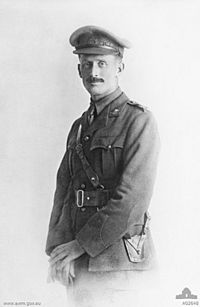Charles Pope facts for kids
Quick facts for kids
Charles Pope
|
|
|---|---|

Lieutenant Charles Pope c. 1917
|
|
| Born | 5 March 1883 London, England |
| Died | 15 April 1917 (aged 34) Louverval, France |
| Buried |
Moeuvres Communal Cemetery Extension, France
|
| Allegiance | Australia |
| Service/ |
Australian Imperial Force |
| Years of service | 1915–17 |
| Rank | Lieutenant |
| Unit | 11th Battalion |
| Battles/wars | First World War |
| Awards | Victoria Cross |
Charles Pope (March 5, 1883 – April 15, 1917) was an Australian soldier. He received the Victoria Cross (VC), which is the highest award for bravery. This award is given to soldiers in British and Commonwealth forces who show great courage in battle. Charles Pope was given the Victoria Cross after he died, for his brave actions during World War I in France. This happened during the Battle of Lagnicourt on April 15, 1917.
Early Life
Charles Pope was born in Mile End, London, England, on March 5, 1883. His father, William, was a police officer, and his mother was Jane. Charles went to school in Navestock, Essex.
Later, he moved to Canada and worked for Canadian Pacific Railways. In 1906, he returned to England and joined the police force. That same year, he married Edith Smith. They had two children, Edith Maude and Charles William.
In 1910, Pope left the police and moved his family to Perth, Western Australia. There, he worked as a furniture salesman and later in insurance.
Military Service
When World War I began, Charles Pope decided to join the army. He enlisted with the First Australian Imperial Force (AIF) on August 31, 1915. He volunteered to serve overseas.
He was assigned to the 11th Battalion. This unit was made up mostly of soldiers from Western Australia. After his training, he quickly became a sergeant. By February 1916, he was promoted to second lieutenant. Four months later, he sailed to England. His battalion had moved to Europe after fighting at Gallipoli.
On December 9, 1916, Pope arrived on the Western Front in France. He joined the 11th Battalion. They had fought in tough battles earlier that year. Later that month, he was promoted to lieutenant. In early 1917, he attended a special training school.
Battle of Lagnicourt
On April 15, 1917, during the Battle of Lagnicourt in Louverval, France, Lieutenant Pope was in command of a small but very important guard post. He was ordered to hold this position no matter what. A large German force attacked his post. They were much greater in number.
His men were surrounded, and their ammunition was running low. In a desperate act to save the position, Lieutenant Pope showed incredible bravery. He was seen charging with his men directly into the much larger enemy force. They were eventually overwhelmed. However, they caused many losses to the German soldiers.
Charles Pope had followed his orders to fight to the very end. His body, along with most of his men, was found among 80 dead enemy soldiers.
Victoria Cross Award
Even though the 11th Battalion lost over 245 soldiers, they managed to hold their part of the battle line. For his amazing bravery, Charles Pope was awarded the Victoria Cross after his death. The award was officially announced on June 8, 1917.
Charles Pope is buried at Moeuvres Communal Cemetery Extension in France. His Victoria Cross medal is on display at the Australian War Memorial in Canberra.
Legacy
A ward at the former Repatriation General Hospital, Hollywood was named the Charles Pope ward. This was done to honor his memory and bravery.
 | James B. Knighten |
 | Azellia White |
 | Willa Brown |

